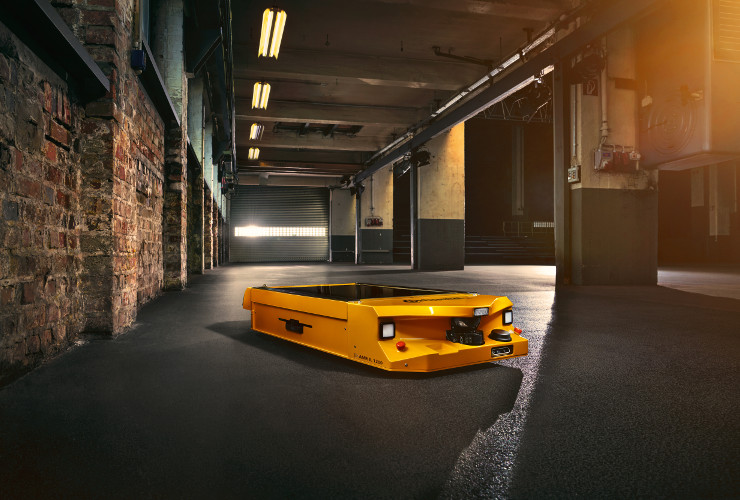In the run-up to the handing out of the IFOY Awards in Dortmund on June 22nd, we are running through all the 2023 finalists and share the verdict from the IFOY test conducted during the evaluation by an expert jury in March. Our next entry (alphabetically speaking) is the AMR IL 1200 from Continental Automotive Technologies GmbH.
Category: AGV / AMR
IFOY Test Report
The AMR IL 1200 automates the flow of materials in production plants, warehouses or logistics centres. The robust industrial truck is equipped with field-proven technologies: Lidar sensors for 360° detection of the environment, 3D camera systems, intelligent software and an optional ultra-wideband (UWB) transmitter for precise live tracking of the industrial truck in the fleet make the AMR a valuable device. The vehicle autonomously executes transport orders, can avoid obstacles and calculate alternative routes. An optional fleet management system can coordinate a larger fleet of AMRs.
The most important innovations of the AMR Il 1200 compared to its predecessor include an increase in travel speed to up to 2m/s, which enables even faster transport while maintaining the same level of safety. The prerequisites for this safety are created by an optimised sensor concept, which leads to an improvement in all-round protection. The optimised drive components and a reduction in the turning circle make the AMR IL 1200 even more agile and powerful than its predecessor. The company’s signature robustness and durability of the hardware combined with several new superstructures, including Cart, Load Module and Top Roller, ensure that unlike its predecessor, the AMR IL 1200 can be used for multiple applications. Other features of the industrial truck include a compact design and integrated lifting system for loads up to 1.2 tonnes.
On the course set up for the IFOY TEST DAYS, the Continental team deliberately kept the distance between the side walls at one of the transfer stations for the floor rollers (dimensions: 1,200 x 800mm), which serve as transport aids, small. In this way, the manufacturer wanted to show how precisely the autonomous industrial truck can drive into such stations.
IFOY test verdict: The AMR IL 1200 is designed for transporting loading aids in the manufacturing industry and logistics. The focus is on production logistics with heavy pallets, such as those found in the automotive industry. To broaden the application portfolio for the vehicle, various superstructures and load handling attachments are available. The compact and modern design should also be emphasised. The technical equipment allows mixed traffic with other industrial trucks and people. Calculations by the manufacturer show that the efficiency gains achieved by using the AMR IL 1200 result in savings of up to 80% of operational costs in terms of in-house transport of loading equipment.
IFOY Innovation Check:
Market relevance: The AMR IL 1200 vehicle from Continental, which has been further developed based on a predecessor vehicle, automates the transport of floor rollers in the 1200x800mm format on which euro pallets, large load carriers or comparable load carriers are transported. The market for this type of transport, correctly located by Continental itself in the production logistics of the automotive industry and the metal processing industry, has great relevance there. However, transports with floor rollers of this format are by no means used in all companies, which is why the market relevance is only rated as balanced.
Customer benefit: The manoeuvrability of the vehicle enables good user benefits. In addition, the user benefits from the vehicle’s extensive sensory equipment, which leads to the expectation of robust and trouble-free operation, as the impressive demonstration on the IFOY TEST DAYS exhibition floor showed. With the vehicle’s steering software, the functionality can be well adapted to different operational environments and tasks.
Novelty / Innovation: In the vehicle class for transporting floor rollers with pallets, a larger number of solutions are available on the market. The particularly flat and compact design combined with the multiple monitoring of the driving area, also above the scan level of the safety sensors, give the vehicle a good level of novelty that makes it stand out in the named market segment.
Functionality / Type of implementation: The AMR IL 1200 performs transport tasks reliably and also offers autonomy functions to avoid obstacles on blocked sections. The load pick-up and load delivery are solidly designed. The approaches to specified sources and sinks of a transport network require more driving surface than an area-moving vehicle with the implemented three-wheel chassis but were reliably demonstrated in the demonstration operation.
Verdict: Vehicles like the IL 1200 have a market but transports with floor rollers in the 1200x800mm format are by far not used in all companies. The manoeuvrability of the vehicle provides good benefits for the users. In this flat form combined with the good manoeuvrability, the vehicle is new and offers good functions for the user.
Market relevance Ø
Customer benefit +
Novelty / Innovation +
Functionality / Type of implementation +
KEY: ++ very good / + good / Ø balanced / – less / – – not available}






